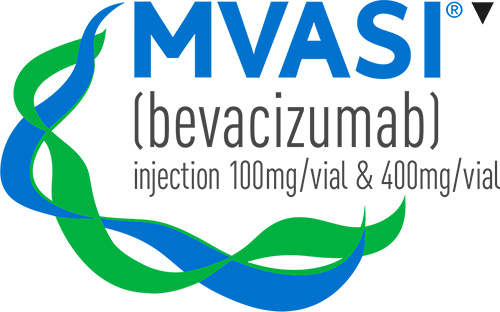First infusion:
Administer over 90 minutes

The information contained in this website is for European healthcare professionals only
I understand and confirm I am an EU healthcare professional
Read more >
Read more >
I am not an EU healthcare professional
Read more >
Read more >
▼This medicinal product is subject to additional monitoring. This will allow quick identification of new safety information. Healthcare professionals are asked to report any suspected adverse reactions.
Key Product Characteristics
MVASI®: THE AMGEN® BEVACIZUMAB THAT GIVES YOU CONFIDENCE AND CONTINUITY OF CARE1,2

MVASI® CAN NOW BE USED FOR YOUR BEVACIZUMAB-ELIGIBLE PATIENTS AND IS APPROVED FOR USE IN THE SAME WAY AS AVASTIN®*†1,2
- Same tumour types†1,2
- Highly similar efficacy and safety profile1-3
- Same pharmaceutical composition, including excipients and pH1-5
*MVASI® has been approved as a biosimilar of Avastin® and is dosed and administered in the same way.
†The MVASI® therapeutic indications do not include use in combination with paclitaxel for patients with platinum-resistant recurrent epithelial ovarian, fallopian tube, or primary peritoneal cancer.
MVASI® HAS BEEN DESIGNED TO MATCH THE PHARMACEUTICAL PROPERTIES OF AVASTIN® INCLUDING EXCIPIENTS & pH1,2,4,5
| MVASI® | Same as Avastin® | |
|---|---|---|
| PRESENTATIONS1,2 | 100 mg / 4 ml 400 mg / 16 ml |
|
| CONCENTRATION1,2 | 25 mg/ml | |
| EXCIPIENTS1,2 | Trehalose dihydrate, sodium phosphate, polysorbate 20, water for injections | |
| pH4,5 | 6.2 | |
| SHELF LIFE1,2 | 2 years | |
| STORAGE1,2 | Refrigerator (2°C - 8°C), do not freeze. Keep in the outer carton to protect from light |
|
| APPROVED TUMOUR TYPESठSee Summary of Product Characteristics for full indication description |
Metastatic colorectal cancer, advanced epithelial ovarian§, fallopian tube§, or primary peritoneal cancer§, non-small cell lung cancer§, metastatic breast cancer§, metastatic renal cell cancer, metastatic cervix carcinoma | § |
Importance of matching excipients & pH:
- ISOPP is recommending to carefully evaluate potential impact of excipients & pH of a biosimilar that do not match the one of the reference product
“Differences between originator and biosimilar product formulations do not alter clinical efficacy, but may enhance immunogenicity or intolerability risks. Inactive components should be reviewed for each biosimilar product before use.”8
(International Society of Oncology Pharmacy Practitioners (ISOPP). Oncology pharmacists issue position statement on biosimilars, Statement 4)
(International Society of Oncology Pharmacy Practitioners (ISOPP). Oncology pharmacists issue position statement on biosimilars, Statement 4)
| MVASI®1,4 | Avastin®2,5 | ||
|---|---|---|---|
| EXCIPIENTS | Trehalose dihydrate, sodium phosphate, polysorbate 20, water for injections |
= |
Trehalose dihydrate, sodium phosphate, polysorbate 20, water for injections |
| pH | 6.2 | = |
6.2 |
‡MVASI® has been approved as a biosimilar of Avastin® and is dosed and administered in the same way.
†The MVASI® therapeutic indications do not include use in combination with paclitaxel for patients with platinum-resistant recurrent epithelial ovarian, fallopian tube, or primary peritoneal cancer.
Indications
MVASI® IS APPROVED FOR THE SAME TUMOUR TYPES AS AVASTIN®ǁ†1,2
| Avastin® (BEVACIZUMAB)2 | MVASI®1 | ||
|---|---|---|---|
| METASTATIC COLORECTAL CANCER | |||
| ADVANCED EPITHELIAL OVARIAN, FALLOPIAN TUBE, OR PRIMARY PERITONEAL CANCER | † | ||
| NON-SMALL CELL LUNG CANCER | |||
| METASTATIC BREAST CANCER | |||
| METASTATIC RENAL CELL CANCER | |||
| METASTATIC CERVICAL CANCER |
ǁMVASI® has been approved as a biosimilar of Avastin® and is dosed and administered in the same way.
†The MVASI® therapeutic indications do not include use in combination with paclitaxel for patients with platinum-resistant recurrent epithelial ovarian, fallopian tube, or primary peritoneal cancer.
Dosing and Administration
MVASI®: SAME DOSING AND ADMINISTRATION AS AVASTIN®1,2
| METASTATIC COLORECTAL CANCER | |
| With fluoropyrimidine-based chemotherapy | 5 mg/kg or 10 mg/kg every 2 weeks or 7.5 mg/kg or 15 mg/kg every 3 weeks |
| EPITHELIAL OVARIAN, FALLOPIAN TUBE, OR PRIMARY PERITONEAL CANCER | |
| Front-line treatment for advanced disease: With carboplatin and paclitaxel |
15 mg/kg once every 3 weeks up to 6 cycles of treatment followed by continued use of MVASI® as single agent until disease progression or for maximum of 15 months or until unacceptable toxicity, whichever occurs earlier |
| First recurrence of platinum-sensitive disease: With carboplatin and gemcitabine |
15 mg/kg once every 3 weeks for 6 cycles and up to 10 cycles, followed by continued use of MVASI® as single agent until disease progression |
| First recurrence of platinum-sensitive disease With carboplatin and paclitaxel |
15 mg/kg once every 3 weeks for 6 cycles and up to 8 cycles, followed by continued use of MVASI® as single agent until disease progression |
| Platinum-resistant recurrent disease: With topotecan (given weekly) or pegylated liposomal doxorubicin |
10 mg/kg once every 2 weeks, followed by continued treatment until disease progression or unacceptable toxicity |
| Platinum resistant recurrent disease: Topotecan (given on days 1-5, every 3 weeks) |
15 mg/kg once every 3 weeks, followed by continued treatment until disease progression or unacceptable toxicity |
| ADVANCED, METASTATIC OR RECURRENT NON-SMALL CELL LUNG CANCER | |
| First-line treatment: With platinum-based chemotherapy |
7.5 mg/kg or 15 mg/kg once every 3 weeks in addition to platinum-based chemotherapy for up to 6 cycles of treatment followed by MVASI® as a single agent until disease progression or until unacceptable toxicity |
| METASTATIC BREAST CANCER | |
| With paclitaxel | 10 mg/kg once every 2 weeks or 15 mg/kg once every 3 weeks until progression of the underlying disease or until unacceptable toxicity |
| ADVANCED AND/OR METASTATIC RENAL CELL CANCER | |
| With interferon alfa-2a | 10 mg/kg once every 2 weeks until progression of the underlying disease or until unacceptable toxicity |
| PERSISTENT, RECURRENT OR METASTATIC CERVICAL CANCER | |
| With paclitaxel and cisplatin or paclitaxel and topotecan | 15 mg/kg once every 3 weeks until progression of the underlying disease or until unacceptable toxicity |
MVASI®: FOR RECONSTITUTION AND ADMINISTRATION AS AN INTRAVENOUS (IV) INFUSION1


Second infusion:
Administer over 60 minutes if first infusion is tolerated
Administer over 60 minutes if first infusion is tolerated

Subsequent infusions over 30 minutes:
If infusion over 60 minutes is tolerated
If infusion over 60 minutes is tolerated
Patients should continue treatment until progression of the underlying disease or until unacceptable toxicity
Note: MVASI® is for intravenous use. It should not be administered as an intravenous push or bolus.1
References:
- MVASI® (bevacizumab) EU Summary of Product characteristics. August 2020.
- Avastin® (bevacizumab) EU Summary of Product characteristics. March 2020.
- EMA. Committee for Medicinal Products for Human Use (CHMP). MVASI Assessment Report, EMA/798844/2017. Nov 2017.
- MVASI® (bevacizumab) US prescribing information. June 2019.
- Avastin® (bevacizumab) US prescribing information. June 2019.
- Amgen® Inc. Annual Report, Form 10-K 2018. Available at: https://www.sec.gov/Archives/edgar/data/318154/000031815419000008/amgn-12312018x10kq42018.htm [accessed 29 January 2020].
- Data on file.
- International Society of Oncology Pharmacy Practitioners (ISOPP). Global position on the use of biosimilars in cancer treatment and supportive care. 4 October 2019. Available at: https://www.isopp.org/sites/default/files/resource/files/ISOPP%20Global%20Position%20on%20the%20Use%20of%20Biosimilars.pdf [accessed 27 January 2020].
